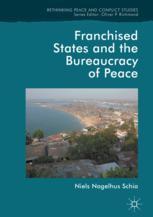

Most ebook files are in PDF format, so you can easily read them using various software such as Foxit Reader or directly on the Google Chrome browser.
Some ebook files are released by publishers in other formats such as .awz, .mobi, .epub, .fb2, etc. You may need to install specific software to read these formats on mobile/PC, such as Calibre.
Please read the tutorial at this link: https://ebookbell.com/faq
We offer FREE conversion to the popular formats you request; however, this may take some time. Therefore, right after payment, please email us, and we will try to provide the service as quickly as possible.
For some exceptional file formats or broken links (if any), please refrain from opening any disputes. Instead, email us first, and we will try to assist within a maximum of 6 hours.
EbookBell Team

0.0
0 reviewsThis book examines a new type of state formation evoked by the rise of transnational rule, what Schia calls franchised states. Drawing on anthropological studying-through fieldwork within the UN organization, he demonstrates how peacebuilding activities turned Liberia into an object of governing, whereby the UN, in seeking to build the state, also became the state. The sovereign state of Liberia here emerges as a franchise rather than a self-contained entity. Two implications follow: First, that international peacebuilding turns post-conflict countries into clients of the international community. Second, that “sovereignty” is no longer exclusively associated with the state: it is organized in and through specific practices of governing where a state actor is only one among a range of actors. With these findings, the book moves beyond previous work on peacebuilding by focusing on the unbundling of sovereignty. It contributes to the literature on the changing forms of sovereignty by showing the specific ways in which sovereignty is organized, packaged and enacted, often by actors working under international auspices.
This book will be of interest to practitioners and students interested in international organizations, international relations, the study of international practices, UN, and peacebuilding.